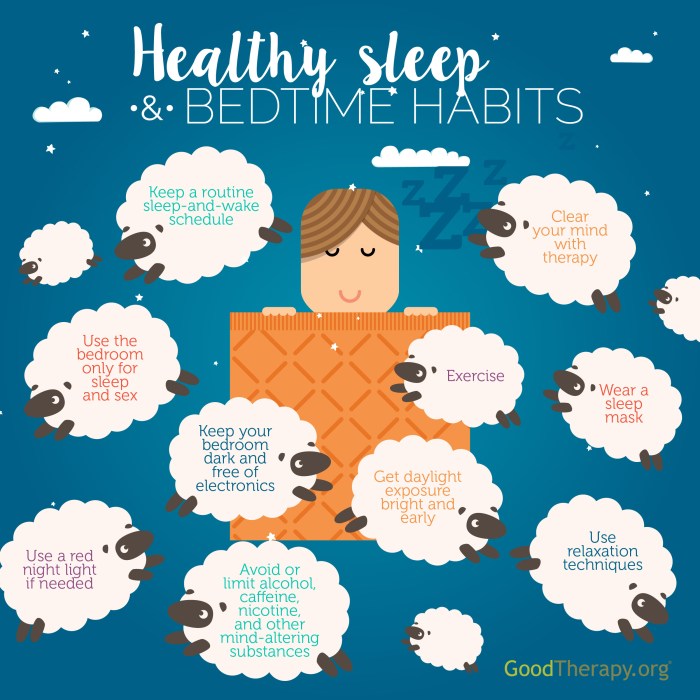Sleep hygiene sets the stage for a rejuvenating slumber and energized days, diving into the essentials of creating an environment conducive to quality rest and overall well-being. From bedtime routines to managing stress, this guide unveils the secrets to a truly restful sleep.
Importance of Sleep Hygiene
Having good sleep hygiene is crucial for maintaining overall health and well-being. It involves creating a bedtime routine and environment that promotes quality sleep.
Impact of Poor Sleep Hygiene
Poor sleep hygiene can have significant negative impacts on daily life and productivity. Examples include:
- Increased risk of obesity and weight gain
- Impaired cognitive function and memory
- Mood disturbances and irritability
- Greater susceptibility to illnesses
Benefits of Good Sleep Hygiene
Maintaining good sleep hygiene practices can lead to a variety of benefits, such as:
- Improved focus and concentration
- Enhanced mood and emotional well-being
- Increased energy levels throughout the day
- Boosted immune system function
Creating a Sleep-Inducing Environment: Sleep Hygiene
To optimize your bedroom for better sleep quality, it’s essential to consider the role of light, noise, temperature, and even your mattress, pillows, and bedding.
Optimizing Light, Noise, and Temperature
Light, noise, and temperature play crucial roles in promoting good sleep hygiene. Here are some tips:
- Avoid bright lights before bedtime, and consider using blackout curtains or a sleep mask to block out any unwanted light.
- Keep noise to a minimum by using earplugs or a white noise machine if needed.
- Maintain a comfortable room temperature, ideally between 60-67°F, to support restful sleep.
Choosing the Right Mattress, Pillows, and Bedding
Investing in the right mattress, pillows, and bedding can significantly impact your sleep quality. Consider the following:
- Choose a mattress that provides adequate support for your body type and preferred sleep position.
- Select pillows that keep your head and neck aligned with your spine to prevent discomfort.
- Opt for breathable and comfortable bedding materials, such as cotton or linen, to regulate your body temperature throughout the night.
Establishing a Bedtime Routine

Establishing a consistent bedtime routine is crucial for training your body and mind to wind down and prepare for sleep. By following a set routine each night, you signal to your brain that it’s time to relax and get ready for rest, leading to improved sleep quality and overall well-being.
Relaxing Activities for Bedtime Routine
- Reading a book: Engaging in a calming activity like reading can help reduce stress and promote relaxation before bed.
- Listening to calming music or white noise: Playing soothing sounds can create a peaceful environment conducive to sleep.
- Practicing deep breathing or meditation: Techniques like deep breathing or mindfulness meditation can help calm the mind and body, making it easier to fall asleep.
- Taking a warm bath or shower: A warm bath can help relax tense muscles and lower body temperature, signaling to your body that it’s time to sleep.
Impact of Electronic Devices on Sleep Quality, Sleep hygiene
Electronic devices emit blue light, which can interfere with the production of melatonin, the hormone that regulates sleep-wake cycles. Exposure to screens before bed can disrupt your circadian rhythm and make it harder to fall asleep. To minimize their disruption, try to:
- Avoid screens at least an hour before bed: Give yourself time to unwind without the stimulation of electronic devices.
- Use blue light filters: Many devices have settings that reduce blue light emissions in the evening, helping to protect your sleep quality.
- Charge devices outside the bedroom: Keeping electronics out of the bedroom can help create a sleep-friendly environment free from distractions.
Healthy Habits for Better Sleep
Regular exercise has been shown to improve sleep quality and duration. Physical activity helps regulate your body’s internal clock, making it easier to fall asleep and stay asleep. Aim for at least 30 minutes of moderate exercise most days of the week for optimal sleep benefits.
Exercise and Improved Sleep Hygiene
Regular exercise can help reduce stress and anxiety, leading to better sleep. It also boosts the production of endorphins, which promote relaxation and help you unwind before bedtime. Incorporating activities like yoga or stretching exercises can be especially beneficial for winding down at night.
Dietary Tips for Better Sleep
Maintaining a balanced diet can positively influence sleep patterns. Avoid heavy meals close to bedtime and opt for lighter snacks if you’re hungry. Foods rich in tryptophan, such as turkey, nuts, and seeds, can help promote relaxation and improve sleep quality. Additionally, try to limit your intake of caffeine and sugar, as they can interfere with your sleep cycle.
Managing Caffeine, Alcohol, and Nicotine
Caffeine, alcohol, and nicotine can disrupt your sleep patterns if consumed in excess. Limit your intake of caffeine in the afternoon and evening to prevent it from affecting your ability to fall asleep. Similarly, avoid consuming alcohol close to bedtime, as it can disrupt your REM sleep cycle. Nicotine is a stimulant that can make it harder to fall asleep, so consider cutting back or quitting smoking to improve your sleep quality.
Managing Stress and Anxiety

Managing stress and anxiety is crucial for promoting better sleep. When we are stressed or anxious, it can significantly impact the quality of our sleep, leading to difficulties falling asleep or staying asleep. By implementing effective strategies to manage stress and anxiety, we can create a more conducive environment for restful sleep.
Impact of Stress on Sleep Quality
Stress triggers the release of cortisol, also known as the stress hormone, which can interfere with the natural sleep-wake cycle. This disruption can result in difficulty falling asleep, frequent awakenings during the night, or early morning awakenings. Addressing stress is essential for improving sleep quality.
- Practice relaxation techniques such as deep breathing, progressive muscle relaxation, or mindfulness meditation to calm the mind and body before bedtime.
- Engage in regular physical activity to reduce stress levels and promote better sleep. Exercise releases endorphins, which are natural stress relievers.
- Establish a worry journal to write down any concerns or anxieties before bedtime, allowing you to release these thoughts from your mind and promote relaxation.
- Limit exposure to stressful stimuli such as watching the news or engaging in stimulating activities close to bedtime.
